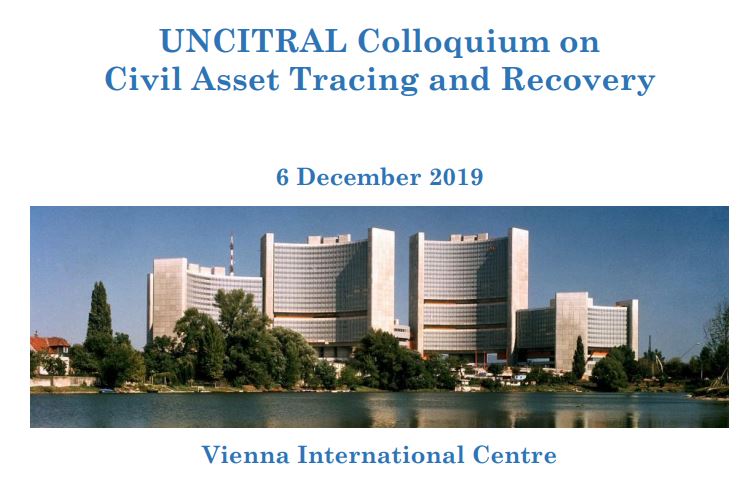 On 6 December 2019, the United Nations Commission on International Trade Law (UNCITRAL) Working Group V (Insolvency Law) hosted a Colloquium in Vienna on civil asset tracing and recovery. The one-day Colloquium brought together over 100 attendees. This included a select group of international specialists and practitioners to discuss ongoing trends and legal issues around the tracing and recovery of assets in the context of insolvency, fraud and the enforcement of judgements and arbitral awards. The specialists that were present included lawyers, international and intergovernmental organizations, financial institutions, academia, specialist investigators, among others.
On 6 December 2019, the United Nations Commission on International Trade Law (UNCITRAL) Working Group V (Insolvency Law) hosted a Colloquium in Vienna on civil asset tracing and recovery. The one-day Colloquium brought together over 100 attendees. This included a select group of international specialists and practitioners to discuss ongoing trends and legal issues around the tracing and recovery of assets in the context of insolvency, fraud and the enforcement of judgements and arbitral awards. The specialists that were present included lawyers, international and intergovernmental organizations, financial institutions, academia, specialist investigators, among others.
One of the main objectives of the Colloquium was to understand how UNCITRAL can contribute to enhancing asset tracing and recovery. Panelists were more or less unanimous in acknowledging the need for a ‘toolkit’ to pool together legal, investigative and strategic solutions by jurisdiction. UNCITRAL can play a role in developing and administrating this toolkit, gathering insight from specialists and making it available to all practitioners.
Observations made by panelists and practitioners included:
- Timing: In the context of asset recovery, the race against time is a given. The existing Model Law on Insolvency has significantly reduced recovery timelines. It was discussed that a similar procedure should be considered by national courts dealing with non-insolvency related recoveries (including asset recoveries related to fraud and the enforcement of judgements and arbitral awards) allowing for these to take priority, acknowledging that money and other assets move fast.
- Funding: asset recovery is by nature international and costly. Lack of funding remains one of the main hinderances to recovery. In some jurisdictions, champerty laws remain a firm barrier to third party funding for asset recovery. It was discussed how funding should be made more readily available for investment in well-coordinated asset recovery strategies.
- Range of legal systems and practices: Given the multijurisdictional nature of asset recovery, being able to take advantage the tools offered by each individual jurisdiction can make for more efficient and effective recovery/enforcement. Discussions centered around differences between Common law vs. Civil law with their varying range of injunctive relief (e.g., discovery/disclosure applications, pre-judgement attachment procedures, among others); the use of criminal proceedings to advance civil claims (e.g., Switzerland); legal access to centralized registries of bank accounts (e.g., Fichier des Comptes Bancaires ‘FICOBA’ in France); publicly available information and registries (the UBO registries in the EU); the use of bankruptcy and insolvency proceedings in asset recovery. The potential advantages of ‘Forum shopping’ were also discussed.
- Type of assets and complexities of ownership: Assets may take many forms ranging from a property to a receivable from a third party. While there are legal and investigative tactics that can be used to identify them, the mechanisms for concealing assets continue to grow more sophisticated. Cryptocurrencies and the challenges that exist to their recovery had a center stage in discussions. It was also discussed how basic search tools can be made more widely available to practitioners.
The report of the Colloquium will be submitted for discussion before the Commission at its fifty-third session (set for the 6-17 July 2020 in New York) and upon its issuance will be made available on the web page of the Commission.
 |
Submitted by ArbitralWomen member Joana Rego, a Founding Partner of Raedas, a specialist investigations firm focussing on disputes and asset recovery. Joana attended the December 2019 Working Group V session as an observer on behalf of ArbitralWomen.

